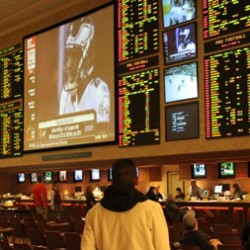NJ Governor Attempts To Overturn Federal Law Preventing Legalized Sports Betting

New Jersey opened its first legalized casino in 1978, and by the end of 2013 internet gambling was added to the state’s range of gambling options. Since 2006, however, New Jersey’s gambling industry has continued to languish in the doldrums, and so NJ Governor Chris Christie and his gambling supporters are currently pushing to allow the state’s casinos to offer legalized sports betting.
NJ sports betting a $100 million a year business
Currently, just four US states offer legal sports gambling, namely Nevada, Delaware, Oregon, and Montana, although experts estimate that each year more than $500 billion is also wagered illegally on sports. The federal law known as the “Professional And Amateur Sports Protection Act“ or alternatively the “Bradley Act” was passed by the US Congress in 1992, and despite New Jersey being given the option to join the handful of states offering legalized sports gambling, the Garden State failed to pass the new law within the allotted calendar year, therefore excluding it from being granted immunity from the federal law.
Back then, New Jersey’s gambling industry didn’t have to contend with the extreme competition it currently faces from neighbouring states, such as Pennsylvania, Maryland, and Delaware, but now as the state attempts to lure more and more gamblers away from its competitors, NJ Governor Chris Christie has thrown his weight behind what has been described as “a fundamental states-rights issue.”
According to Union Gaming Group analyst Robert Shore, sports betting revenue in Nevada amounts to around $72 million each year, and likewise New Jersey could generate at least $100 million annually in sports gaming revenue, not including the extra dollars it could attract in increased tourism.
“I definitely think New Jersey would be better than Las Vegas for sports betting because you have so many rabid sports fans throughout the northeast. I think it would be a game changer. It would definitely be a huge opportunity, if it ever happened,” explained Shore.
NJ claims Bradley Act is unconstitutional
Back in 2011, a New Jersey referendum voted in favour of allowing sports betting, which was then swiftly passed into law by the Legislature. Nevertheless, the 22-year-old Bradley Act stops New Jersey offering legalized sports betting at its casinos and horse racing tracks, and so in his efforts to overturn the federal law Gov. Chris Christie has already spent just shy of $3 million on legal fees in order to take his case to the U.S. Supreme Court.
In its case, the state is arguing that the 1992 federal statute limiting sports betting to Nevada, Delaware, Oregon and Montana, is unconstitutional, violates the 10th Amendment by commandeering the state Legislature, and that the US Government had no right to offer an initial window of opportunity of one-year to New Jersey. As the state wrote in its appeal:
“It impermissibly trenches on the states’ authority to regulate their own citizens, and it does so in a manner that discriminates among the states. That double-barreled infringement on the sovereign prerogatives of the states calls out for review.”
Hurdles to overturning a 22-year-old federal law
Nevertheless, New Jersey faces significant hurdles if it is to have the Professional And Amateur Sports Protection Act overturned, not least because the U.S. Supreme Court only hears around 100 of the 10,000 cases it receives each year, equivalent to just 1% of petitions.
Whereas many in the state are pessimistic about the chances of the case prevailing, or even being heard by the Supreme Court, New Jersey does at least have something on its side. The fact that the case involves the demarcation of powers between federal and state governments has given some cause for optimism. As state Sen. Raymond Lesniak (D-Union), explains, “I think they’re going to take the case because it’s of great magnitude — of social issues that have been on the front burner of the Supreme Court in recent years.”
Failure to act will hurt Atlantic City
Gambling advocates are concerned the federal government’s failure to allow sports books in the state will ultimately harm Atlantic City casinos and racetracks, with a lack of sports betting cited as a reason the state’s gambling venues are no longer able to remain competitive in the 21st century gambling market. Monmouth Park Racetrack has even taken the opportunity to file its own high court petition, with the track’s top attorney Ronald Riccio, stating:
“It could mean the difference between becoming an economically viable racetrack facility or not. And if Monmouth Park is forced some day to close, it’s going to do significant damage to the entire equestrian industry in New Jersey.”
Other sports betting proponents have also suggested legalizing sports gambling was a moral imperative, and that federal approval would help halt organized crime’s illegal betting activities, although others have dismissed that argument, suggesting gamblers will still continue to place bet via illegal bookies who offer credit lines. As former New Jersey illegal bookmaker John Alite, explains:
“The guy that has no money in his pocket..is still going to call the local bookmaker to bet,” before adding that legalized sports betting would represent “just one more bookmaker coming to town.”









